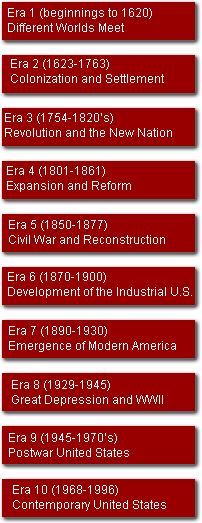 |
 |
 |

ERA 2 HIGHLIGHTS IN NEW HAMPSHIRE: permanent English settlements; arrival of black Africans; human-landscape interactions; cultural exchange; colonial government; English, Native American, and French rivalries and warfare; differences with Massachusetts The first permanent English
settlements in New Hampshire occurred later than those of the French to
the north or the Spanish to the distant south. Europeans came to New Hampshire
for economic reasons,
In this era Native American, European, and African peoples from three continents converged. Colonial New Hampshire society was a complex product of cultural interaction. Cultural interaction, for instance, brought European diseases that wiped out up to 95% of the Native American population before most European settlers had arrived. Likewise both sides learned about new foods, articles of clothing, words, and ways of life. England and France acted
out their rivalries around the globe, and one of their troublesome battlegrounds
turned out to be northern New England between 1500 and 1763. Native Americans
were often drawn into the conflict asallies to one or the other side, even
when they tried to remain neutral. Leaders such as Passaconaway and Wonalancet
tried to formulate the best reaction to European intrusions on the Native
American homeland, and those reactions varied from all out warfare to accommodation.
The narratives of white captives during this conflict became a new American
literary form, usually with religious overtones. The Treaty of Paris in
1763 marked the victory of England over France. After this, the interior
of New Hampshire opened up to English settlement. Many Abenakis retreated
into what is now Vermont and
During the same period, in Africa, some tribal societies had grown into large and prosperous kingdoms. England participated in the African slave trade, and when English colonists came to America, slaves and free men came with them. The African slave trade, fired by a need for labor in the New World, depleted and disrupted the populace in the interior of Africa, creating political imbalance on that continent. African slaves were brought to New Hampshire very early. The first recorded slave in Portsmouth appears in the records in 1645. Economic investors, political
contenders, the English Crown, Native Americans, Africans, and Massachusetts
Bay Colony contended for control of the government during the New Hampshire
colonial era.
Differences between Massachusetts
Bay Colony and New Hampshire also began in this era. In general, while
the first New Hampshire colonists pursued economic ends, the Puritan government
of Massachusetts Bay pursued religious ends. At times, such as during the
rule ofLt. Governor John Wentworth, New Hampshire was united with Massachusetts
Bay. At other times. New Hampshire kept its
|